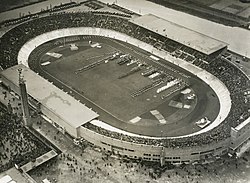Contents
| Men's 110 metres hurdles at the Games of the IX Olympiad | |||||||||||||
|---|---|---|---|---|---|---|---|---|---|---|---|---|---|
 Olympic Stadium in Amsterdam | |||||||||||||
| Venue | Olympic Stadium | ||||||||||||
| Dates | July 31, 1928 (heats & semifinals) August 1, 1928 (final) | ||||||||||||
| Competitors | 41 from 24 nations | ||||||||||||
| Winning time | 14.8 | ||||||||||||
| Medalists | |||||||||||||
| |||||||||||||

| Athletics at the 1928 Summer Olympics | ||
|---|---|---|
| | ||
| Track events | ||
| 100 m | men | women |
| 200 m | men | |
| 400 m | men | |
| 800 m | men | women |
| 1500 m | men | |
| 5000 m | men | |
| 10,000 m | men | |
| 110 m hurdles | men | |
| 400 m hurdles | men | |
| 3000 m steeplechase | men | |
| 4 × 100 m relay | men | women |
| 4 × 400 m relay | men | |
| Road events | ||
| Marathon | men | |
| Field events | ||
| Long jump | men | |
| Triple jump | men | |
| High jump | men | women |
| Pole vault | men | |
| Shot put | men | |
| Discus throw | men | women |
| Javelin throw | men | |
| Hammer throw | men | |
| Combined events | ||
| Decathlon | men | |
The men's 110 metres hurdles event at the 1928 Olympic Games took place between July 31 & August 1. [1] Forty-one athletes from 24 nations competed. [2] The maximum number of athletes per nation was 4. [3] The event was won by Sydney Atkinson of South Africa, the nation's first title in the 110 metres hurdles; Atkinson became the first man to win two medals in the event (he had taken silver in 1924). It was only the second time the United States had not won the event; as in 1920, the Americans took silver and bronze.